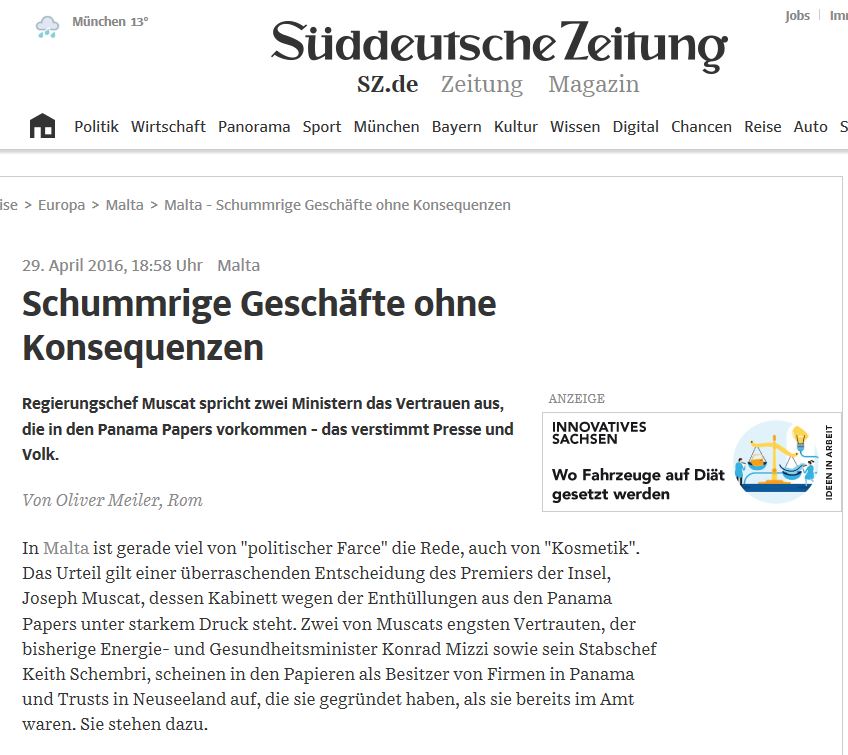“Shady deals without consequences”: Süddeutsche Zeitung’s damning article about Muscat and Mizzi
One of Germany’s largest and most influential newspapers, Süddeutsche Zeitung, on Friday ran a damning article about the Maltese prime minister’s ‘decisions’ of the previous day. Here is the link to the piece in German but below you will find it translated by a native speaker of German.
SHADY DEALS WITHOUT CONSEQUENCES
Prime Minister Muscat affirms his confidence in two government officials whose names are in the Panama Papers; this upsets the press and people.
By Oliver Meiler, Rome – Friday, 29 April 2016
There is a lot of talk in Malta right now about a “political farce” and “cosmetic changes”. This is the popular verdict on a surprising decision by the island’s prime minister, Joseph Muscat, whose cabinet is under strong pressure because of the revelations of the Panama Papers. Two of Muscat’s closest confidants, the former Energy and Health Minister Konrad Mizzi and his chief of staff Keith Schembri, appear in the papers as the owner of companies in Panama and trusts in New Zealand, which they set up when they were already in office.
When Muscat called a press conference yesterday to deliver an important message, many Maltese assumed that he would, after much hesitation, dismiss the two gentlemen. But he did not. “The Panama Papers affair hurts us, personally and politically,” he said at the start of the press conference, “and even if nothing illegal has happened, better behavior is expected.”
Then he announced that Mizzi would be divested of the health and energy portfolios and of his deputy leadership of the Labour Party, but would keep his rank as Minister – for unspecified special tasks. The prime minister would take on the energy portfolio himself. Keith Schembri remains his chief of staff. “He is not a political figure,” Muscat said, “I trust him.” He conceded that this could change if independent auditors conclude that Mizzi and Schembri have committed misdemeanours. The investigation has started already, but could still take “several months”.
The comments in the newspapers are nearly always devastating. The Malta Independent, for example, writes: “The prime minister has lost all sense of decency.” He should step down, the newspaper said. A few days ago, The Malta Independent also published an interesting survey. It had submitted two possible scenarios to a representative sample of Maltese people, asking them to express their voting intentions in either scenario. Scenario 1: Mizzi and Schembri remain in their posts. Then the ruling Labour Party would lose significantly in a general election. Scenario 2: If the two leave the government, Muscat’s Labour can expect a clear victory.
The prime minister had empirically tested reasons to dismiss the two government officials. That he did not do this is only surprising at first glance. Muscat could perhaps afford to play for time until now, because he has a loyal majority in parliament, who have supported him already in a no-confidence vote against the entire cabinet. Now a second motion has been brought before parliament, against Minister Mizzi along. Muscat has urged his parliamentary group to vote with the party whip and reject the motion. Lifting the whip, he said, will only happen in votes on moral issues and questions of conscience. But this does not seem to be a moral issue or a question of conscience for the Maltese prime minister.
One reason for Muscat’s hesitation is that Mizzi and Schembri are among his most important companions; the political destiny of the three seems to be closely interlinked. All three have offices in the Auberge de Castille, the seat of government in Valletta. It seems to have been of primary importance to Muscat to keep his trusted companions close to him when he came to power.
Another person adds spice to the office story: the financial advisor Brian Tonna, who helped Mizzi and Schembri set up those companies in Panama, also has a desk at the Auberge de Castille. Tonna is managing partner of the financial advisory firm Nexia BT, with which the Panamanian law firm Mossack Fonseca co-operates in Malta. Tonna also has a company through which he sells Maltese passports under the scheme run by the Maltese government for the past two years. Rich newcomers can acquire one for €650,000. New revelations show that Tonna has issued invoices for his services through a third company registered in the British Virgin Islands. Tonna has so far refused to comment about the matter except to say that the Maltese tax authorities have been informed.
So a lot of shady things have come together. Malta’s tax authorities have said that they have begun to investigate all the individuals and firms referred to in the Panama Papers. The Maltese people could rest assured that action will then be taken, they said. Apparently the authorities consider it appropriate to reassure the public – with uncertain success.

